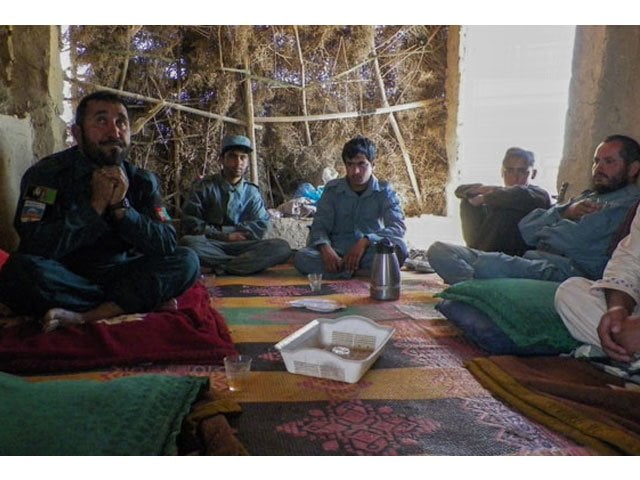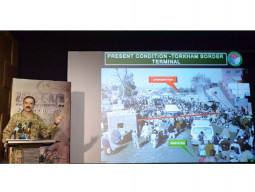
TARIN KOT: The Taliban are accused of using child sex slaves to attack police in southern Afghanistan, exploiting the cultural practice of "bacha bazi" -- paedophilic boy play -- for military gain.
The subculture of keeping boys for personal servitude and sexual pleasure is a centuries-old practice in Afghanistan, which observers call one of the most egregious violations of human rights in the country.
"Women are for child-rearing, boys are for pleasure" is a common saying across many parts of Afghanistan.
The ancient custom, banned under the Taliban's 1996-2001 rule, has seen a resurgence in recent years. It is said to be widespread across southern and eastern Afghanistan's rural Pashtun heartland, and with ethnic Tajiks across the northern countryside.
Powerful warlords, commanders, politicians and other members of the elite often keep "bachas" as a symbol of authority and affluence.
Taliban use 'honey trap' boys to kill Afghan police
Bachas, dressed as women, are widely used by these men as dancers at private parties and are sexually exploited.
Bacha bazi is not widely seen as homosexual behaviour -- popularly demonised as a deviant sexual act, prohibited in Islam -- and is largely accepted as a cultural practice.
Tight gender segregation in Afghan society and lack of contact with women have contributed to the spread of bacha bazi, rights groups say.
Several other factors such as an absence of the rule of law, corruption, limited access to justice, illiteracy, poverty, insecurity, and the existence of armed groups have also resulted in the spread of bacha bazi, the Afghanistan Independent Human Rights Commission (AIHRC) said in a report in 2014.
AIHRC points out that Afghanistan's criminal law prohibits rape and pederasty, but there are no clear provisions on bacha bazi.
"There is a gap and ambiguity in the laws of Afghanistan regarding bacha bazi and the existing laws do not address the problem sufficiently," the report said.

This photograph taken on April 30, 2016, shows an Afghan military checkpoint on the outskirts of Tarin Kot, the capital of southern Uruzgan province. PHOTO: AFP
"Many of the perpetrators have connections with the security organs and by using power and giving bribes they get exempted from punishment."
'Instant paradise': An Afghan child bomber's journey
Bachas are typically aged between 10 and 18. Sometimes they are kidnapped, says AIHRC, but often desperate poverty drives their families to sell them to abusers.
"The victims of bacha bazi suffer from serious psychological trauma as they often get raped," AIHRC's report said.
"Such victims suffer from stress and a sort of distrust, hopelessness and pessimistic feeling. Bacha bazi results in fear among the children and a feeling of revenge and hostility develop in their mind."
In turn, many adolescent victims are said to grow up to have boy lovers of their own, repeating the cycle of abuse.
"In the absence of any services to recover or rehabilitate boys who are caught in this horrendous abuse, it's hard to know what happens to these children," said Charu Lata Hogg, a director at London-based charity Child Soldiers International.
"We have heard anecdotal reports that many grow up to keep their own bachas, perpetuating the revolving door of abuse."
Bacha bazi is having a detrimental bearing on the perpetual state of conflict in Afghanistan, helping the Taliban to infiltrate security ranks in provinces such as Uruzgan, officials say.
The abusive practice in security ranks also undermines support for NATO-trained Afghan forces.
After Taliban music ban, songbook teaches Afghan children to sing again
"To date, the US has provided over $60 billion in assistance to the Afghan National Defense and Security Forces (ANDSF), including nearly $500 million to the Afghan Local Police," the US Congress said in December.
"Predatory sexual behaviour by Afghan soldiers and police could undermine US and Afghan public support for the ANDSF, and put our enormous investment at risk."
The practice also continues to embolden the Taliban's desire to reassert sharia law in Afghanistan and is fuelling their insurgency.
"Such wild abuses of the predatory mujahideen forces in the early 1990s drove the popularity of the austere Taliban, helping them sweep to power across most of the country. Similar behaviour of the government forces after 2001 is also helping to inspire the insurgency," a Western official in Kabul told AFP.




























































COMMENTS (12)
Comments are moderated and generally will be posted if they are on-topic and not abusive.
For more information, please see our Comments FAQ